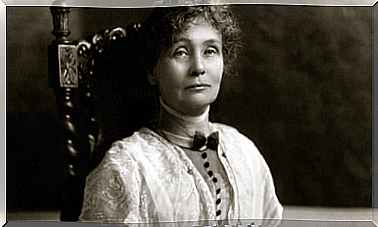Strategies For Coping With Grief And Its Consequences

Everyone has or will experience grief at some point in their lives. Whether it’s the death of a loved one, a divorce, resignation or moving house, it’s always about losing something that was really important. It is a process in which you have to deal with your emotions and adjust your life. However, everyone has different strategies for coping with grief.
For some people it is easy to accept and adjust to their new reality. For others, it feels like their world is crashing down on them. Confusion, pain and anger torment them and rob them of all happiness.
The fact that each person has a different strategy for coping with grief explains these differences. If you think your coping strategy isn’t working, there are a few things you can do to change the process.

Strategies for coping with grief
Coping is defined as the set of cognitive and behavioral efforts set in motion to deal with and respond to internal or external needs.
A situation that overwhelms a person leads to stress. That’s when coping strategies kick in to help the person adapt to the stated needs.
Grief is without a doubt a very overwhelming experience that makes you resort to your coping mechanisms. As we mentioned above, there are many different coping strategies and not all of them are built in the same way.
Problem-focused coping strategies
In this case, all your resources focus on the problem that needs a solution. There are three problem-oriented coping strategies:
- Reflective: analyzing and thinking about the situation and yourself and planning how to proceed.
- Reactive: impulsive and uncontrolled activities, driven by your distorted thoughts.
- Oppressive: In this case, you deny what happened and avoid exposing yourself to reality.
Reflective strategies bring you closer to a solution. Reactive and suppressive strategies, on the other hand, make it much harder for you to deal with.
Therefore, when you use a problem-solving coping strategy, you identify the stressful situation and evaluate its importance. You also analyze the causes and engage in behavior that will lead to changes.
Emotional Coping
This consists of focusing your energy on the emotions that are causing the problem, not the problem itself. On the one hand, you have emotional processing, which involves recognizing and understanding the emotions you are experiencing. On the other hand, there is emotional expression, which consists of letting go and sharing these feelings with yourself or others.
Emotional coping can also be divided into the three categories we mentioned above: reflective, reactive or suppressive. Here, reflective coping involves analyzing your feelings. Reactive means expressing them impulsively and uncontrollably, and oppressive means avoiding your feelings altogether.

The consequences of strategies for coping with grief
All the strategies we mentioned in this article are ways people deal with loss. If you analyze them carefully, it is easy to determine which strategies to resort to. Each of these strategies has different consequences that determine how quickly you work through grief and how effective the process is.
People who habitually exhibit reactive behavior are more likely to experience a complicated grieving process. They are also more likely to have anxiety and depressive symptoms. Reactive strategies can be helpful at first, as anger can give you a sense of strength, but over time, this emotion becomes a barrier to proper grieving.
On the other hand, those who choose emotional expression and reflective strategies will experience greater growth and positive personal transformation after loss. These strategies will help you find solutions, ask for support in your social circle, and express your feelings in the right way.
So the best way to deal with grief is to identify, express and release your emotions appropriately. In addition, mental clarity and focus on problem solving also help. Denying, avoiding, or acting impulsively about the problem will only intensify your suffering.









